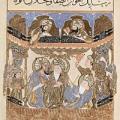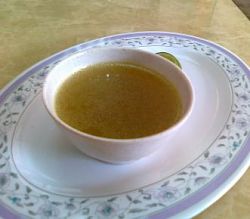134 - Balancing Acts: Arabic Ethical Literature
Drawing on Galen and Aristotle, philosophers from al-Kindi to Miskawayh compose ethical works designed us to achieve health in soul, as well as body.
Themes:
• P. Adamson, “Platonic Pleasures in Epicurus and al-Rāzī,” in P. Adamson (ed.), In the Age of al-Fārābī (London: 2008), 71-94.
• P. Adamson, “The Arabic Tradition,” in The Routledge Companion to Ethics, ed. J. Skorupski (London: 2010), 63-75.
• P. Adamson, “Health in Arabic Ethical Works,” in P. Adamson (ed.), Health: a History (Oxford: 2019), 103-35.
• T.-A. Druart, “Al-Kindī’s Ethics,” Review of Metaphysics 47 (1993), 329-57.
• T.-A. Druart, “The Ethics of al-Rāzī,” Medieval Philosophy and Theology 5 (1997), 47-71.
• M. Fakhry, Ethical Theories in Islam (Leiden: 1994)
• S.H. Griffith (trans.), Yaḥyā b. ʿAdī: The Reformation of Morals (Provo: 2002).
• S.H. Griffith, “Yaḥyā b. 'Adī’s Colloquy On Sexual Abstinence and the Philosophical Life”, in Arabic Theology, Arabic Philosophy, ed. J.E. Montgomery (Leuven: 2006), 299-333.
• C. Zurayk (trans.), Miskawayh: The Refinement of Character (Beirut: 1968).







Comments
Balancing acts
Blaggard, casting aspersions on us:)
Hearing the words from these Islamic philosophers amazes me. How like the Christians, the original message appears to be contorted today in some ways.
These Ethical Treatises
Many thanks for the podcast! First rate work!
You mentioned approximately 8 ethical works (I did not go back to count) in this podcast. Is there any reason to consider this output of practical philsophy unusual? After Boethius, we do not seem to have rationalist ethics in Europe. Would these works be looked upon as pagan?
Perhaps I am not asking the right questions or have some bad assumptions.
In reply to These Ethical Treatises by Stilgar
Ethics
That's an interesting question. It's true that this is a striking phenomenon of the formative period in the Islamic world. I think though that you are underestimating the output in ethics on the Latin side. You've got Abelard (see episode 209) and then quite a lot of engagement with Aristotle's Nicomachean Ethics once it is available in the 13th century. But it also depends a bit on what counts as "practical philosophy," e.g. prior to the rediscovery of Aristotle devotional literature by the Victorines or Hildegard could be considered as work in ethics, but some might reject it as insufficiently rationalist.
Freud...
I was pursing my lips and audibly tsking about the "desires overwhelming reason" and "lower soul" things. I think Freud is taking notes. For real though, half of the bad psychology takes (about ego vs id... folks tend to forget superego anyway) I hear could be citing al-Rāzī instead. Of course, we're also getting a resurgence in the idea of food affecting the spirit in the form of fad clean-eating diets. (In different forms that specifically try to emulate something pure or ancient in our diets - Paleo, non-processed, no-guilt foods, etc. As a kid, my parents liked "Eat Right for your Blood Type," which does seem a little more humours than science-based.)
I also like the 18:30ish idea of universality being mentioned. I don't like a lot of Kant's ideas but that concept always made sense to me to at least consider, and I'm glad to see it didn't originate with him in formal ethics/philosophy. Although I guess you could also call it a sliding slope argument in this context... and in general, now that I think about it.
Works on Arabic reception of the Nicomachean Ethics?
Good evening! Been listening to the podcast since earlier this year, and it's been a truly transformative ride that's still ongoing. Enjoy the rest of your summer break!
I was wondering if you had any reading recommendations on the Arabic reception of the Nicomachean Ethics, specifically Sufi or Sufi-adjacent commentaries. I've been learning more about Sufism after going through the Islamic World series, and how the teacher-student relation has been described has reminded me a lot about the snippets on friendship that I read from NE during high school.
In reply to Works on Arabic reception of the Nicomachean Ethics? by Jefferson
Arabic reception of NE
Hm, interesting. Well we actually have the medieval Arabic translation of the NE, it was published a few years ago. I don't know of Sufis making direct use of that (though I would't rule it out). They may have been influenced by authors who themselves draw heavily on the NE like Miskawayh or Tusi, whose Nasirean Ethics has been translated into English - and it was written in Persian around the time of Rumi so that would be something to look into. I have published a couple of papers on ethical literature in Arabic, if you email me I can send them to you: peter.adamson@lrz.uni-muenchen.de.
Add new comment